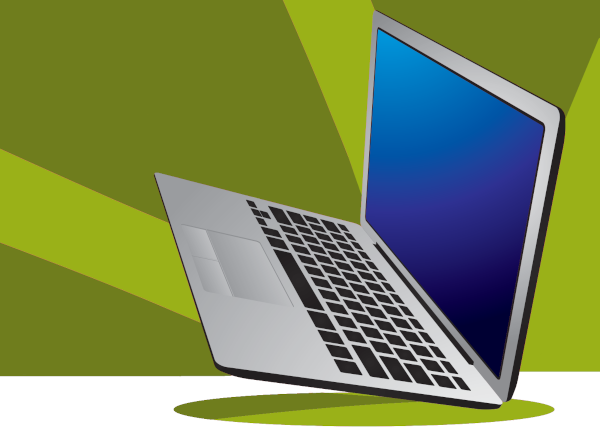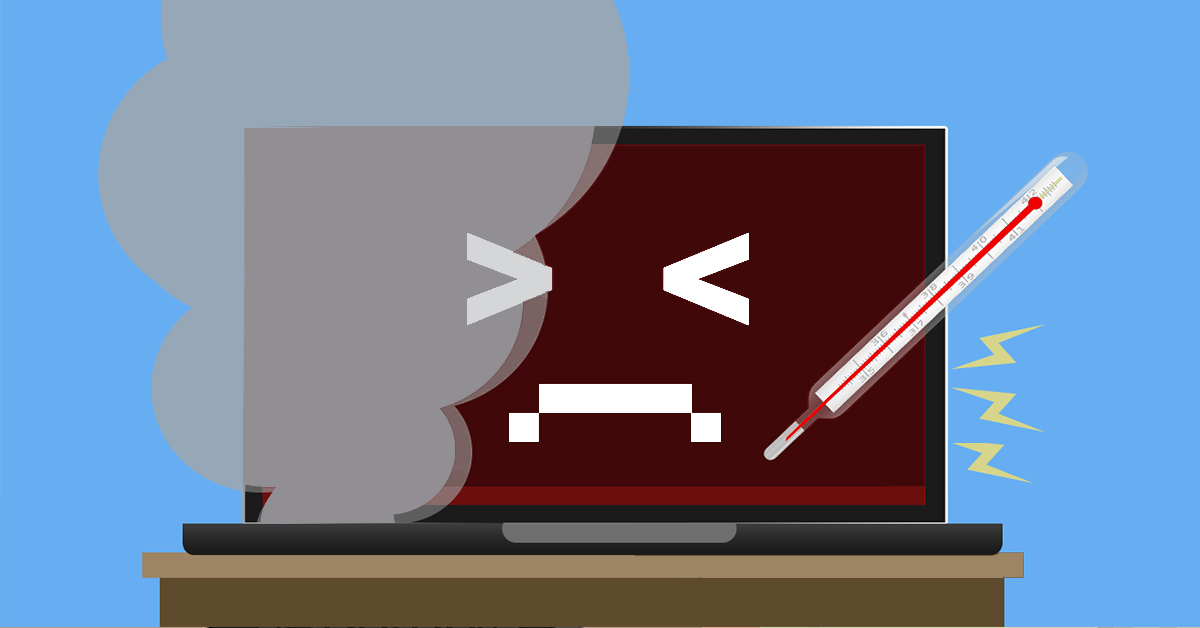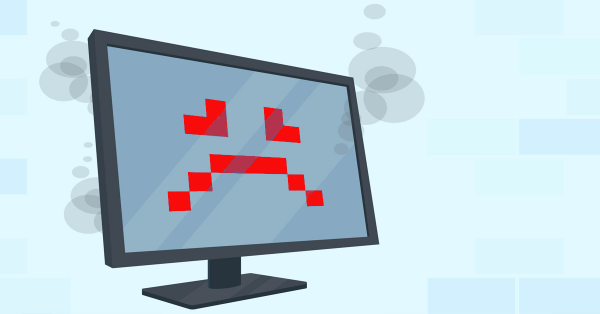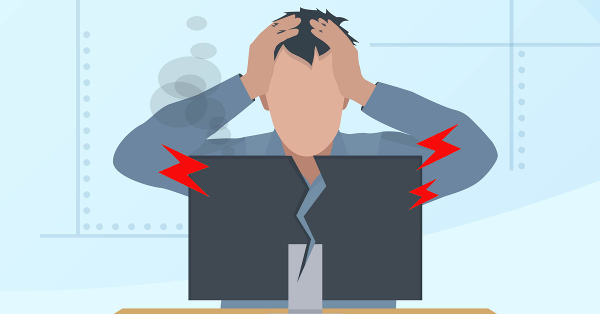
A laptop can hold your entire business life and in most cases, it is essential for your job. Thus you need to keep it in great shape and not physically damage it. Here are some tips on how to protect your laptop. Continue reading


A laptop can hold your entire business life and in most cases, it is essential for your job. Thus you need to keep it in great shape and not physically damage it. Here are some tips on how to protect your laptop. Continue reading
 Laptop computers commonly heat up in normal operation. Electronic components, including large capacity batteries, become warm in use but your laptop should never become too hot to handle.
Laptop computers commonly heat up in normal operation. Electronic components, including large capacity batteries, become warm in use but your laptop should never become too hot to handle.
When a laptop turns hot to the touch or starts to sound like a jet engine, it’s likely something is wrong.
Modern laptops use nearly silent fans to cool components and keep the system safe to use. For the majority of users the sound the computer makes is the best tool you have to diagnose its running condition. Excessive heat causes the fans to work harder and faster to help cool the system down. This jet engine sound is one of the first clues you have to indicate all may not be well.
Due to their compact size and portability, laptop computers are particularly prone to overheating. Their tiny size means electronic parts are closer together and there is less room for cooling vents.
Most laptops have small fans that suck in cool air, passing it over metal fins to exchange heat from the system. The resulting hot air exhaust is expelled through vents back into the room. This helps prevent heat building up inside the machine. The constant air cycle is designed to keep the laptop running cool no matter the workload placed on it.
The process though, can be disrupted by any number of factors during operation. As well as cool air, computer fans also suck in dust, stray hairs and even cigarette smoke. Smoke in particular contains thick tar which coats the fins, fan blades, and internal components.
This foreign debris inside the machine prevents components from working at their best. Tar, dust and hair slows down the internal fan and coats the heat generating components and cooling fins. This coating prevents air exchange and keeps components warm as if they were under a blanket.
Sometimes the way a laptop is used can cause it to overheat. Resting a laptop on thick carpets, blankets, or soft furnishings can block vents, preventing the fans from sucking cold air in or blowing the hot air out.
Leaving the machine running on carpet or furnishings, particularly for extended periods of time causes overheating issues and introduces extra dust into the components too.
The best place for a laptop is on a hard surface such as a desk, table or lap tray. This allows air to access the vents and helps prevent dust and hairs getting inside the machine.
As the computer starts running hotter, the fan will attempt to compensate by running faster and more often. This results in the “jet engine” noise many users report when their computer is struggling to keep up.
Once dust, hair or tar has found its way into the machine it is notoriously difficult to clean out. The only way to properly clean the system is to disassemble the unit and clean out its components.
Much like a car engine, computer components have a designed temperature range in which they can safely and reliably operate. Extended periods of running above the temperature they are designed for causes damage, sudden failures and drastically reduces the lifespan of the computer.
Often random blue screen computer crashes can be traced back to components that have been overheating inside the computer. As heat builds up, vulnerable components start to fail or behave strangely and can cause a range of issues.
When the systems has cooled down and restarted the issue is seemingly resolved. Back in operation, the computer heats up once more and subsequently crashes again. These irregular crashes are highly inconvenient and can cause data loss.
However, these symptoms are minor compared to a completely dead laptop. For some users, the first sign that the machine is too hot is when the motherboard is burnt out or their data storage has been irreparably lost.
If your laptop is running hot to the touch or has started to make loud sounds, bring it to us for a thorough clean out. You can also call us at 08 8326 4364 or
su*****@dp*********.au
.
 As you know computers always break at the worst possible time, but what things can actually cause that that failure? It is easy to think it was something you did at the time of the crash, but normal user actions are rarely the cause of the issue. In this blog post we list some of the real reasons for a computer crash.
As you know computers always break at the worst possible time, but what things can actually cause that that failure? It is easy to think it was something you did at the time of the crash, but normal user actions are rarely the cause of the issue. In this blog post we list some of the real reasons for a computer crash.
1. Physical Damage
People drop their laptop or spill things on their systems. Liquid damage is a big problem with spills the main cause – this could be anywhere from a spill on the keyboard or even a flood that reaches the computer. Laptop users need to be really careful when putting down their systems – surfaces can often have small puddles (especially cafes and kitchen tables). If you are lucky and the liquid didn’t fry the circuits and ongoing corrosion is likely.
A dropped or knocked computer isn’t going to be happy. Even a light bump can cause loose cables, disconnections and internal damage.
2. Age
Computer parts have an expected lifetime, especially moving parts like fans or mechanical hard drives. Some computers can run 24/7 for up to a decade, while others can be barely used but fail within warranty. When age is the issue there are usually early warning signs like extra noise or slowing down, but the actual ‘break’ generally happens when you go to turn the computer on, perhaps after a crash or overnight – either it makes a valiant effort before giving up, or nothing happens at all. Sometimes lasting age is the luck of the draw with how it was manufactured, and quality does play a big part in how long it can keep churning.
3. Power Surges
Computers are very sensitive to both surges (too much electricity) and brownouts (not enough electricity). Some indicators of power issues are when the lights are dimming or flickering (during a brownout) or glowing just a tad too strong (during a surge). These variations usually last long but they can easily break your computer. A surge protector can guard against mild increases in voltage, but brownouts and strong surges can still cause damage unless a high end UPS (Uninterruptible Power Supply) is used.
4. Heat
Overheating is a big contributor to a computers death. The insides of a computer runs hot and they need plenty of cooling to keep them working optimally. You might not feel it from the outside, but internal components can rapidly build up heat that needs to dissipate. When fans and vents get blocked with dust the temperature continues to rise and components can bake themselves to failure. When the computer reaches a certain temperature the computer will automatically switch off (to try and cool down), however the more times this happens, the more likely your computer is to die.
5, Hard Drive Failure
Your data is stored on a hard drive and if you have a mechanical hard drive (most people do), it works a bit like a record player with a spinning ‘platter’ and a needle that reads it. General usage, small bumps, liquid, age, surges and overheating can all trigger hard drive failure. As well as making your computer unusable, hard drive failure means your data is also lost. While sudden breakage might leave you surprised, take note of any strange noises or repeated crashes and always back up your data.
Like a car, your computer needs to be serviced regularly. We can check your computer to make sure it is running right and will keep on working for you. Give us a call at 08 8326 4364 or drop us an email at
su*****@dp*********.au
.

It is pretty obvious when your computer is already broken, but what signs should you look for to see if it is about to break? Before your computer falls into a heap and refuses to turn on or flashes messages about how your files are now encrypted, you usually will be given multiple hints that something is wrong. Here are five common signs your computer needs repair:
Is your computer doing these things? Let us fix it for you. Call us at 08 8326 4364 or at
su*****@dp*********.au
.